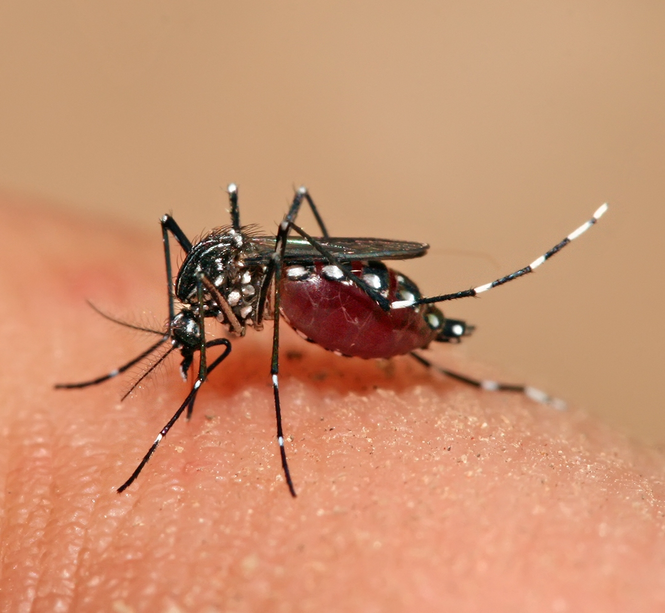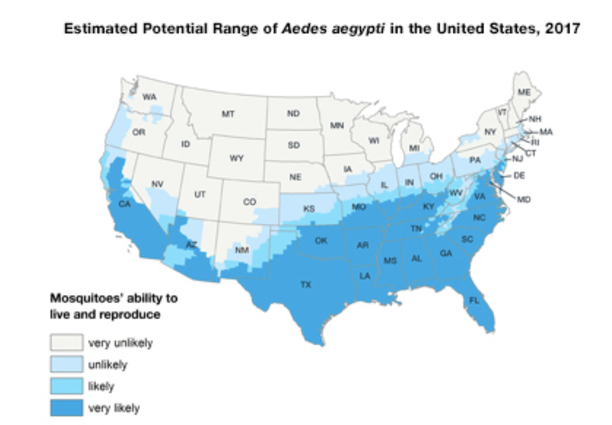|
Written by: Shreya Rajachandran '22 Edited by: Carlie Darefsky '22 Between their pesky bites, overall insolent presence, and dangerous carried diseases, mosquitoes are undeniably a vexing pest of which anyone would like to get rid. Normally, we spray ourselves with gallons of bug-spray and hope for the best; however, because mosquito populations become increasingly resistant to conventional bug-sprays and insecticides, researchers have turned to a revolutionary method of bug control: genetic modification (1). Thanks to this research, scientists have a plan- albeit counterintuitive- to control the population of mosquitoes. Throughout 2021 and 2022, they plan to release 750 million special genetically modified mosquitoes called “OX513” into the Florida Keys (2). Developed by the biotech company Oxitec, OX513 are male* mosquitoes that have been genetically altered to not be able to produce offspring. The genetic modification starts in a lab, where scientists insert a transgene into the DNA of mosquitoes. This transgene carries mutant genes that prevent mosquitoes from producing viable - or living - offspring. Therefore, when the OX513A and any wild female mosquito mate, all of their offspring will die in the larval stage- successfully controlling the population of mosquitoes. (3) The mosquito species that these researchers are focusing on is Aedes aegypti, which is a species which is known to carry deadly diseases such as Zika, dengue, chikungunya, and yellow fever. Based on data from 2017, the CDC found that while Aedes is mainly located in warmer regions, it’s ever-growing range threatens to spread more mosquito-borne illnesses throughout the United States. As a result, it has become an imperative for many countries to limit the spread of Aedes. (4) Excitingly, previous testing in Jacobina, Brazil during 2014 demonstrated that the release of OX513A mosquitoes was successful in controlling the mosquito population. Compared to initial 2014 counts of mosquito larvae throughout areas in which the OX513A strain was released, the 2016 larvae count was dramatically reduced. The success of the Brazil trial prompted Brazil to institute release plans for its major cities in order to control the rising mosquito population. (3) However, it is important to note that there are some critics of this method of mosquito control. A research team at Yale warned of the possibility that these OX513A mosquitoes could spread their transgenes into the general population, potentially creating a more robust mosquito species**. (5) Other groups had ethical concerns about the genetic modification of mosquitoes and warned about the inherent risks that genetic engineering poses to the natural environment. (6) Despite this opposition, genetically modified mosquitoes have the potential to be our solution to the increasing problem of mosquito control, especially as mosquito populations are becoming resistant to insecticide. More and more states in the United States are using the OX513A mosquito method, with both Florida and Texas planning to release these mosquitoes in 2021. (2) Yet, as with any genetically-modified organism, there are possible risks to both the environment and the creation of a super strain due to the sheer unpredictability of nature. * Male mosquitoes do not bite humans; only female mosquitoes bite humans and spread disease. As a result, the release of the OX513A’s will not spread mosquito-borne illnesses. (3) **This claim was later debunked, and the article has been tagged with an editorial Expression of Concern Works Cited: 1. Resnik DB. Field Trials of Genetically Modified Mosquitoes and Public Health Ethics. Am J Bioeth. 2017 Sep;17(9):24–6. 2. 750 million genetically engineered mosquitoes approved for release in Florida Keys - CNN [Internet]. [cited 2020 Nov 14]. Available from: https://www.cnn.com/2020/08/19/health/gmo-mosquitoes-approved-florida-scn-wellness/index.html 3. WHO | Use of transgenic Aedes aegypti in Brazil: risk perception and assessment [Internet]. WHO. World Health Organization; [cited 2020 Nov 14]. Available from: http://www.who.int/bulletin/volumes/94/10/16-173377/en/ 4. Zika Virus [Internet]. CDC. 2014 [cited 2020 Nov 14]. Available from: https://www.cdc.gov/zika/vector/range.html 5. Transgenic Aedes aegypti Mosquitoes Transfer Genes into a Natural Population | Scientific Reports [Internet]. [cited 2020 Nov 14]. Available from: https://www.nature.com/articles/s41598-019-49660-6#citeas 6. Abad-Santos A. Would You Like Your Mosquitos Original or Genetically Engineered? [Internet]. The Atlantic. 2012 [cited 2020 Nov 14]. Available from: https://www.theatlantic.com/technology/archive/2012/07/would-you-your-mosquitos-original-or-genetically-engineered-form/326371/ [Image Citation] Aedes. In: Wikipedia [Internet]. 2020 [cited 2020 Nov 14]. Available from: https://en.wikipedia.org/w/index.php?title=Aedes&oldid=981860691 [Image Citation] Zika Virus [Internet]. CDC. 2014 [cited 2020 Nov 14]. Available from: https://www.cdc.gov/zika/vector/range.html
0 Comments
Leave a Reply. |


